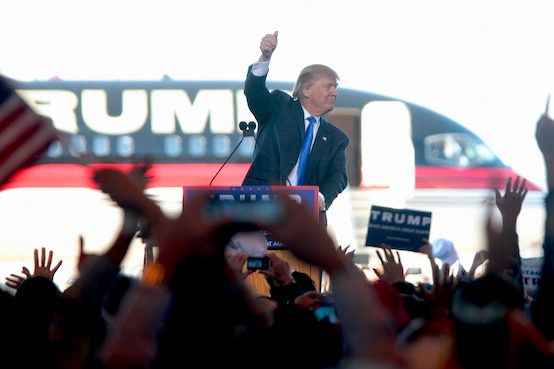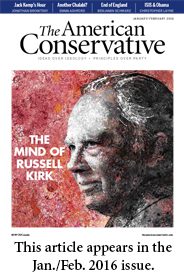Why They Love Trump

I am of several minds about Donald Trump, but I love as countrymen the Trump supporters, drawn from that narrowing swath of Americans who remain patriotic, desperately so, their naiveté laced with cynicism (or is it the other way around?), scorned by their (our) country’s enemies (chickenhawks, social justice warriors, Conservatism, Inc.), so hungry for someone in authority (or on television) who seems to give a damn that they have latched on to the titan of American Bombast.
A Mexican Wall? I’m afraid that my public-works fantasies are limited to painting a splashy LOVE in the road where Exit 48 of the New York State Thruway meets Oak Street, homage to John Gardner’s 1972 novel The Sunlight Dialogues. But then I dream small.
Trump’s base overlaps with that of the last let’s-roll-up-our-sleeves-and-fix-this-thing businessman candidate, Ross Perot, whose bantam martial deportment concealed a relatively pacific, mildly isolationist outlook, skeptical of foreign interventions and openly hostile to such managed trade deals as NAFTA.
The more intriguing Trump parallel is with the much-demonized press baron William Randolph Hearst, remembered today as the target of Orson Welles’s “Citizen Kane” and as the laird of Hearst Castle, which makes Trump Tower look like the Little House on the Prairie.
 Hearst, reviled by the ruling element of both parties, steered a populist course, supporting William Jennings Bryan, denouncing the “hyenas” of Wall Street and their preening bellhop Teddy Roosevelt—who “sold himself to the devil and will live up to the bargain”—and unsuccessfully pursuing the Democratic presidential nomination in 1904, only to be bested by Judge Alton B. Parker, the candidate of Wall Street.
Hearst, reviled by the ruling element of both parties, steered a populist course, supporting William Jennings Bryan, denouncing the “hyenas” of Wall Street and their preening bellhop Teddy Roosevelt—who “sold himself to the devil and will live up to the bargain”—and unsuccessfully pursuing the Democratic presidential nomination in 1904, only to be bested by Judge Alton B. Parker, the candidate of Wall Street.
Hearst earned a lasting reputation as a jingo jackass during the Spanish-American War, though it is unlikely he actually wired Frederic Remington in Cuba, “You furnish the pictures and I’ll furnish the war.” Thereafter Hearst inclined to neutrality, suspicious of foreign entanglements but ever ready to respond to real or perceived slights. His newspapers were blazoned with the declaration “America First Should Be Every American’s Motto.”
Like Trump, who has refused to rattle sabers against Putin, Hearst was soft on Russia, boldly advocating recognition of the Bolshevik government in the 1920s. Hearst was also a full-throated immigration restrictionist, both on racist anti-Asian grounds and also because he saw hard-working immigrants as undermining the standard of living of the American workingman.
Neither appreciated the Little America or contented himself with homely pleasures and republican simplicity. Trump, with his ridiculous boast that “I’m the most militaristic person there is,” surely would assent to this Hearstian sonority: “We want big Americans, in a big America, guarded by a big navy, fearing nobody, bullying nobody, insulted by nobody and sitting in peace and honor, ringed with her hundred ships of battle, ready and able to face the world in a just struggle.” But for all this bluster, Hearst stood with the peace party before both world wars.
Trump is especially popular among veterans; the scriveners of the Hearst empire wasted no shade of purple in plumping for an endless infusion of cash and benefits to ex-soldiers, whether in establishment-friendly (the GI Bill) or menacingly populist (the Bonus Army) form. Hearst was downright radical in championing the Bonus Army, that aggregation of 20,000 threadbare veterans of Mr. Wilson’s War to End All Wars who camped in Washington during the summer of 1932 before Douglas MacArthur routed them. Trump and Bernie Sanders are the only current candidates one can imagine supporting the Bonus marchers—or Boners, as they were called.
As Ian Mugridge writes in The View from Xanadu: William Randolph Hearst and American Foreign Policy, “like all effective demagogues he had a knack of putting his finger on the real resentments and grievances of the people to whom he catered and on whom he depended.”
Too much can be made of the parallels—Melania Trump is no Marion Davies, and Hearst had a much better grasp of current affairs—but these two singular plutocrats do share nationalist, anti-elitist impulses, and are, to their credit, hated by our rulers.
The corporate media’s defamatory fusillade aimed Trumpwards is the treatment always meted out to candidates who genuinely threaten the establishment, from Henry Wallace and Pat Buchanan to, in a lesser key, Perot and Jesse Jackson.
’Tis bizarre that the hopes of so many decent American patriots repose in this celebrity deal-maker, but this is what we are left with after the collapse of the mystifying campaigns of Jim Webb and Rand Paul, the men who ought to have been appealing to those Trump voters.
And if Trump succeeds in destroying the Republican Party of Karl Rove and Sheldon Adelson and the whole coppice of Bushes—why, then he’ll merit a “Citizen Kane” of his own.
Bill Kauffman is the author of 10 books, among them Dispatches from the Muckdog Gazette and Ain’t My America.